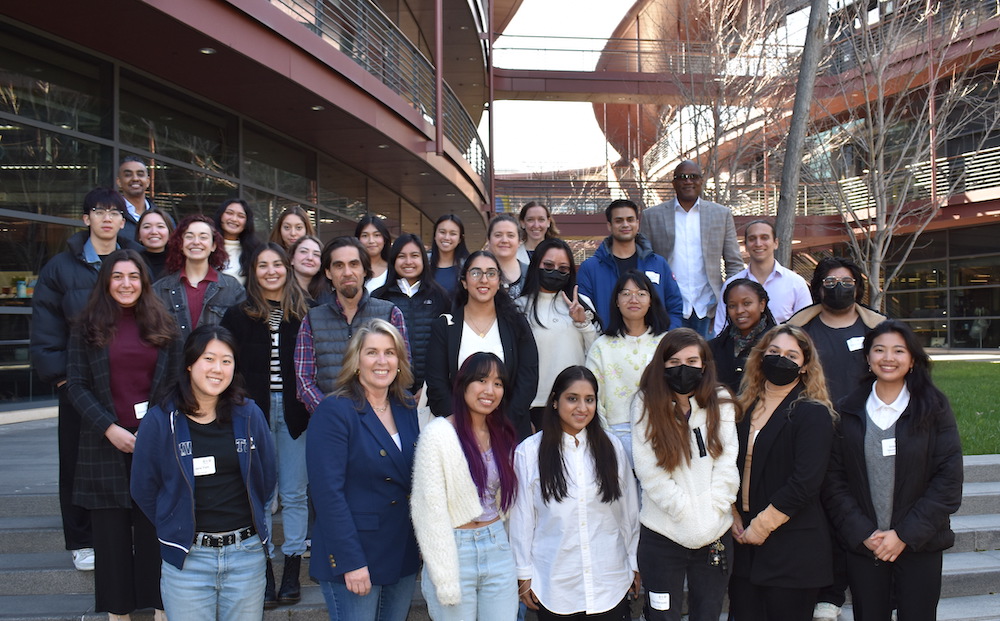Stanford Biodesign, Fogarty Innovation and leading medical device companies come together to train and mentor innovators of the future
PALO ALTO, Calif., February 22, 2023 — A diverse cohort of students selected from 10 Bay Area community colleges are participating in the first-ever Pathways in Health Technology. The immersive 8-week program brings together the Stanford Byers Center for Biodesign, Fogarty Innovation and five local medical device companies to mentor students and help prepare them for future careers in the industry.
“Pathways in Health Technology is DxD HealthTech’s first program to extend the pipeline into the community college level,” said Ingrid Ellerbe, executive director of DxD HealthTech. “Here, we can capture the imaginations of students who may not even be aware of what the health technology industry entails, and help them understand the array of incredible opportunities available to them to contribute meaningfully to health equity and access through their unique skills and perspectives, whether engineering or business.”
Of the 26 students in the inaugural cohort, 85 percent are women and 42 percent are from groups that have been historically underrepresented in science and technology. The students in the program are from Cañada College, City College of San Francisco, College of Marin, College of San Mateo, De Anza College, Foothill College, Las Positas College, Los Medanos College, Merced College and Skyline College.
The hope is that these students can be the future of health technology innovation, bringing more diverse perspectives that make medtech more equitable, accessible and trusted.
“We’re excited to welcome these talented students to our inaugural Pathways in Health Technology program,” said Paul Yock, M.D., founder of Stanford Biodesign and co-founder of DxD. “We’ve tried to design a really engaging program, taught by top-notch industry leaders and Stanford faculty, to introduce these students to the exciting opportunities in the health technology industry – and hopefully convince them it’s the right field for them to invest their talents.”
The program includes an introduction to different career opportunities within health technology, engineering showcases from participating medtech companies, and one-on-one mentorship opportunities. The program culminates with a hands-on project where students will work in small groups on a clinical project in partnership with a health tech company and present their novel ideas.
“We’re very fortunate here in the Bay Area to be home to some of the most innovative and exciting health tech companies, and even more fortunate that several have stepped up to invest their time, energy and talent in helping to increase diversity in the field for the next generation of innovators,” said Mike Regan, Chief Innovation Officer of Fogarty Innovation and co-founder of DxD.
Companies participating in the program by providing mentors, instructors, and facilitating group projects, include Cala Health, Element Science, Imperative Care, Pulmonx and ReCor Medical.
The program meets eight times between January 20 and April 15, with the final session including student presentations and a certificate ceremony. Students who complete the program will receive a $1,000 grant, funded by the Advanced Medical Technology Association (AdvaMed) in collaboration with MedTech Color.
DxD was launched jointly by Fogarty Innovation and Stanford Biodesign in 2020 following a study published in Annals of Biomedical Engineering that revealed numerous workplace inequalities in the health technology industry that negatively affect women. Respondents reported that they didn’t feel like part of the team at work and their ability to rise was hampered by a lack of access to the networks of power and influence that open the doors to leadership positions. The survey also found that mentoring made a difference in terms of job satisfaction and an inclusive environment. DxD focused on gender initially, but now focuses on racial equity and other dimensions of diversity with the goal to bring more women and people of color into the health tech ecosystem, and amplify their voices.
DxD HealthTech is supported by Affiliate Members including XII Medical, Enspectra Health, Hyperfine, Imperative Care and Longitude Capital.
About Diversity by Doing (DxD) HealthTech
DxD is an industry-based collaborative that seeks to enhance diversity, equity, and inclusion in the health technology innovation ecosystem. In collaboration with its partners, DxD empowers diversity change agents in small- to mid-stage healthtech companies by providing education, expert voices, experiential programs and practical resources. DxD has built a suite of programs that address diversity across the pipeline, from early programs like the summer seminar, to speed mentoring programs for early and mid-career individuals, to a free lecture series that helps companies operationalize DEIB in hiring, supply chain, and corporate culture. DxD was founded and is supported as a partnership between Fogarty Innovation and Stanford Byers Center for Biodesign. For more information, please visit https://diversitybydoing.org.
About Fogarty Innovation
Headquartered on the El Camino Health campus in Mountain View, California, Fogarty Innovation is a leading medical technology nonprofit dedicated to advancing human health worldwide. Driven by a dedicated team of seasoned experts in the field, the organization fosters stronger alliances among innovators, industry and government, creating a powerful engine for the invention, development and deployment of new health technologies into the care pathway. Fogarty Innovation was founded by Thomas J. Fogarty, MD, a world-renowned cardiovascular surgeon, inventor, and entrepreneur. For more information, please visit https://fogartyinnovation.org.
About the Stanford Byers Center for Biodesign
Co-founded in 2001 at Stanford University by Paul Yock, MD and Josh Makower, MD, the Stanford Byers Center for Biodesign is committed to advancing health outcomes and equity through innovation education, translation and policy. We believe that diversity across multiple dimensions inspires creativity and helps us innovate for all patient populations. To date, more than 7.6 million people have been helped by technologies initiated during Stanford Biodesign training programs, and the Biodesign innovation process has been widely adopted by universities and training programs around the world. For more information, please visit https://biodesign.stanford.edu/.
# # #

